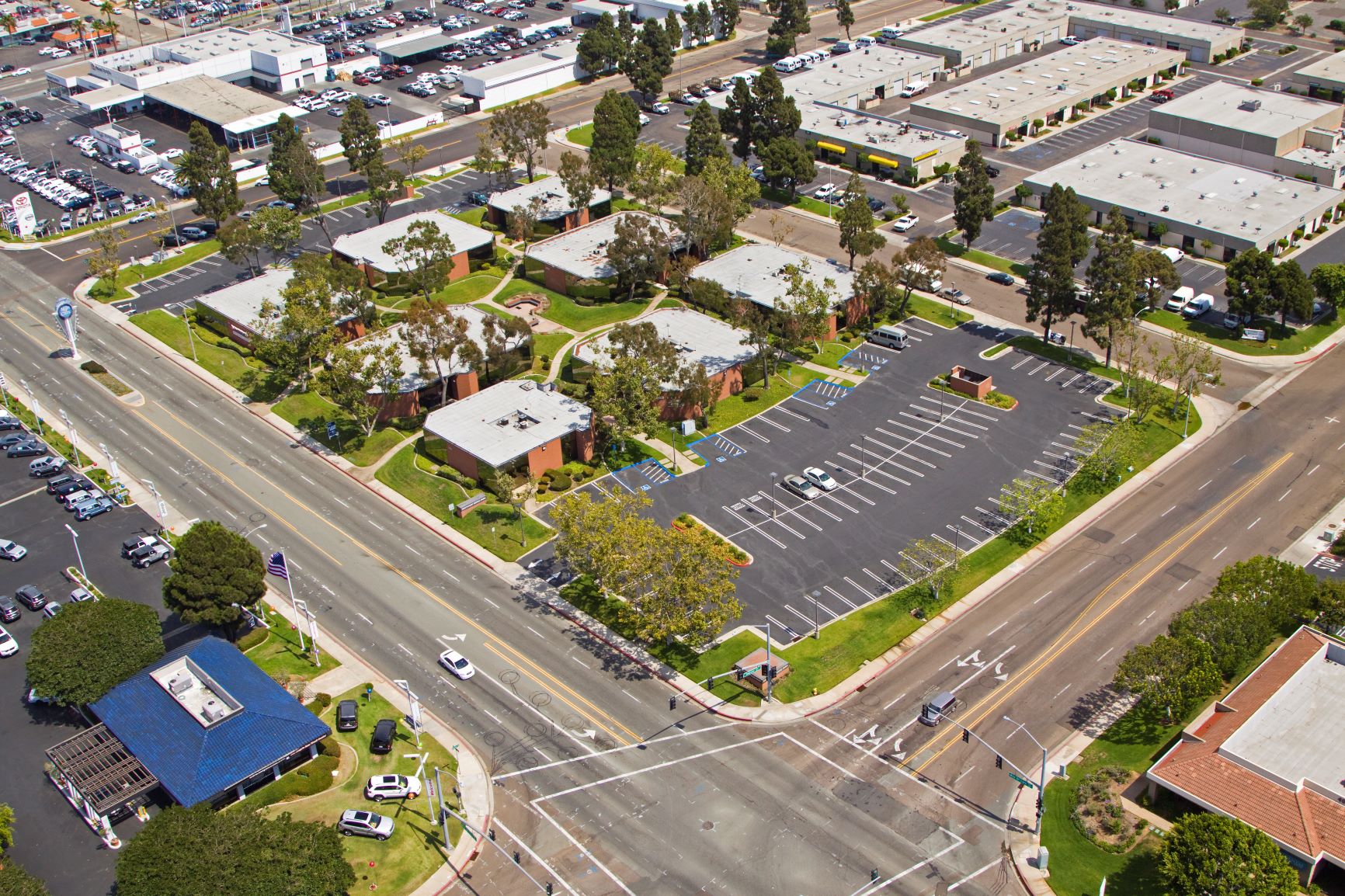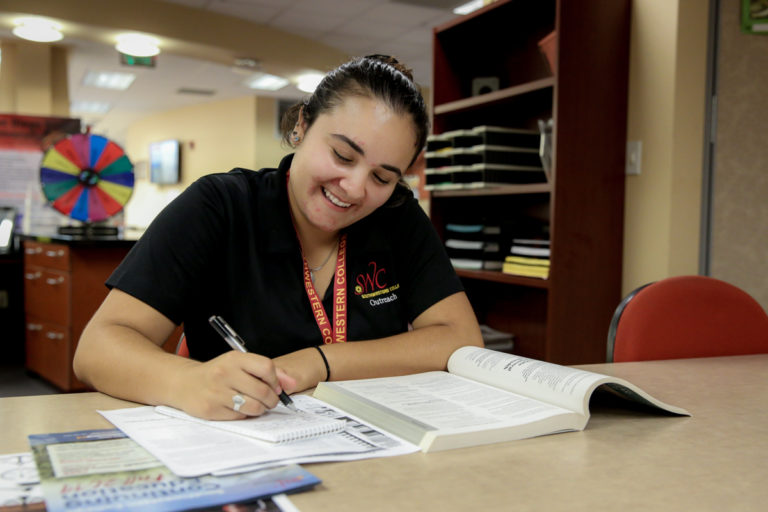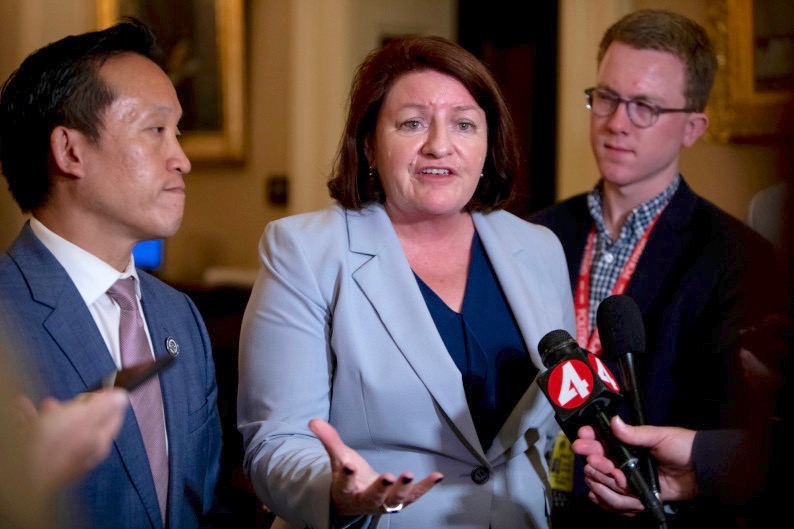Daily Business Report-Sept. 16, 2019
Senate President Pro Tem Toni Atkins with Assemblyman Davis Chiu. (Photo by Anne Wernikoff for CalMatters)
Gov. Newsome breaks with Democrats
on environmental ‘Trump insurance’ bill
In a break with the Democratic-controlled Legislature, Gov. Gavin Newsom sided with farmers and water agencies Saturday by rejecting legislation aimed at blocking the Trump administration from rolling back endangered species protections.
Over Newsom’s objections, Senate President Pro Tem Toni Atkins pushed forward with votes on what is the most significant legislation she ever authored, the so-called “Trump insurance” bill.
Senate Bill 1 sought to lock in place clean water, air and labor law that existed on Jan. 19, 2017, the day before President Donald Trump took office. The bill was set to expire in January, 2025, when Trump would be scheduled to leave office after a second term.
Most importantly, Atkins’ bill would have locked in protections of the federal Endangered Species Act. Trump is seeking to roll back endangered species protections and increase water deliveries from the Sacramento-San Joaquin Delta to Central Valley farmers.
In a statement, Newsom said he supports the “principles behind Senate Bill 1: to defeat efforts by the President and Congress to undermine vital federal protections that protect clean air, clean water and endangered species.
“Senate Bill 1 does not, however, provide the state with any new authority to push back against the Trump Administration’s environmental policies and it limits the state’s ability to rely upon the best available science to protect our environment.”
Newsom’s statement signals that he would veto the bill if it reaches him. Although the bill won final legislative approval, Atkins had not taken the formal step of sending the bill to Newsom Saturday night.
Update: Atkins responded with a statement: “SB 1 is the product of a full year’s worth of work, so clearly I am strongly disappointed on its impending fate.”
While calling Newom a “partner,” Atkins disputed Newsom’s interpretation of the legislation, saying: “SB 1 also clearly states that state agencies shall make determinations based on the best scientific information available.”
The measure was opposed by major farm groups, the Westlands Water District, the Metropolitan Water District of Southern California, manufacturers, oil companies, and the California Chamber of Commerce.
Many of Newsom’s allies, including environmentalists, most of organized labor, and Los Angeles Mayor Eric Garcetti supported it.
Atkins had amended the bill several times in an effort to neutralize opposition and reportedly was uncertain whether to press ahead with the legislation as late as Friday, the last day of the Legislature’s 2019 session.
But after gaining passage a 48-22 margin in the Assembly and meeting with environmentalists into the early morning hours on Saturday, she opted to put it to a final vote in the Senate knowing that Newsom was opposed. The Senate approved it 26-14 after midnight Saturday.
“She believes this is a really good bill. She believes in the substance of the bill,” said Kim Delfino, California Director of Defenders of Wildlife, who was among the group that met with Atkins before the vote. “She hoped the governor would believe in her.”
On Saturday, Defino said Newsom “missed an opportunity” by signaling his opposition.
“SB 1 gave him stronger tools to fight the roll-back of environmental protections,” Delfino said.
Newsom administration officials, water contractors, farmers and environmentalists have been meeting to find solutions to the state’s forever battles over water. Water contractors had threatened to walk away from that voluntary process if Senate Bill 1 became law.
Newsom called Atkins “an extraordinary leader on the environment and for our state at large,” and said he looks forward to a “continued partnership” with her to “ensure California can continue to protect our environment and our workers against federal rollbacks, and push back against Trump’s anti-environment agenda.”
___________________
SDG&E’s regional monopoly
is quickly coming to an end
Voice of San Diego
San Diego Gas & Electric’s long-running regional monopoly is quickly coming to an end.
That much was clear following back-to-back votes at last Thursday’s meeting of the San Diego City Council’s environment committee.
First, the committee approved a plan to start a government-run “community choice” energy agency to buy and sell electricity. The full City Council is expected to vote on a final deal this week to enter the energy market with several other neighboring cities and sell power directly to nearly 2 million people.
Then the committee OK’d hiring a group of consultants to help renegotiate the 50-year-old agreement that allows SDG&E to operate its power and gas lines within city limits.
Together, the votes signal a once-in-a-generation change to how the region gets its energy. Both are aimed at preparing the region for climate change, but also represent an ideological shift in favor of elected officials, rather than regulated monopolies, calling the shots.
___________________

Eight-building office park in National City
sold to private investor for $8.75 million
The eight-building Southport Office Park in National City has been sold by H.G. Fenton Company to private investor Dan Floit of San Diego for $8.75 million.
The 33,894 square-foot office park includes 102, 132 and 202 Mile of Cars Way, 2403, 2435, 2425 and 2427 Hoover Ave. and 2405 Transportation Ave.
Voit Real Estate Services directed the sale.
___________________
City attorney sues Instacart for misclassifying
workers as independent contractors
City Attorney Mara W. Elliott has filed a lawsuit against Instacart, alleging the company misclassified employees as independent contractors to evade long-established worker protections under California law. Instacart is a same-day grocery delivery service that operates nationally and is based in San Francisco. Its app allows customers to place grocery orders, which are then purchased and delivered by a “Shopper” who drives the order directly to their home.
The company has a strong presence in the city and County of San Diego, where it launched its services in mid-2016 and expanded to offer services to cover more than one million households about a year later.
Instacart grocery deliverers do not qualify as independent contractors under a 2018 decision by the California Supreme Court that clarified the law in this state, according to Elliott. “Companies like Instacart cannot deprive their employees of the basic job protections guaranteed under state law by calling them independent contractors,” Elliott said. “We are seeking restitution for the workers who’ve been exploited in the past, and we are also demanding that Instacart start legally classifying its workers.”
___________________
U.S. Indian gaming revenues
for 2018 highest in history
The National Indian Gaming Commission has reported the highest gross gaming revenue in Indian gaming history, with figures for the full year of 2018 coming in at $33.7 billion.
Released by vice chair Kathryn Isom-Clause and associate commissioner Sequoyah Simermeyer of the NIGC, the FY 2018 number represents a 4.1 per cent increase from the previous year.
As well as reporting the highest revenue in history, unlike previous years all of the NIGC’s administrative regions also experienced positive growth during the period in question.
San Diego County and Temecula in Riverside County are home to 12 gaming Indian tribes.
The Portland Region showed the highest growth, with an 8.2 per cent increase to $3.7 billion, followed by Oklahoma City with saw a 7.3 per cent rise as it reached $2.5 billion.
___________________
Public workshop to be held Sept. 18
on future design for Horton Plaza Park
The New owners of Horton Plaza are seeking public input on their plan to reimagine Horton Plaza Park to address current shortcomngs and achieve the original goal of creating a safe and vibrant public space.
Stockdale Capital Partners LLC and their design firm Rios-Clementi-Hale Studios invites the members of the San Diego community to participate in a public workshop on Sept. 18
to investigate the unrealized potential of Horton Plaza Park. The event will center on public feedback on the preliminary designs developed from direction gained from two previous public workshops and collecting additional ideas form the community.
The workshop will be from 5:30 to 7:30 p.m. at Horton Plaza (off of Broadway Circle, to the right of Macy’s entry).
___________________
How emotion affects action
Scientists find direct link from brain’s emotion circuit to movement circuit
During high stress situations such as making a goal in soccer, some athletes experience a rapid decline in performance under pressure, known as “choking.” Now, Salk Institute researchers have uncovered what might be behind the phenomenon: one-way signals from the brain’s emotion circuit to the movement circuit. The study, which was published online on Sept. 6, 2019, in eLife, could lead to new strategies for treating disorders with disrupted movement, such as obsessive-compulsive disorder, anxiety and depression, along with aiding in recovery from spinal cord injuries or physical performance under pressure.
___________________
SD Regional EDC launches initiative
to address regional talent shortages
In an effort to provide residents with increased access to high-demand jobs, San Diego Regional EDC and its Advancing San Diego partners unveiled details on the $3 million local investment initiative underwritten by JPMorgan Chase. The collaborative program strives to cultivate a more inclusive San Diego economy, as it looks inward to address regional talent shortages and strengthen the relationship between employers and education systems.
___________________
Sitari Pharmaceuticals acquired by British drug company
Sitari Pharmaceuticals, the first San Diego life sciences company founded under a partnership between Avalon Ventures and UK-based GlaxoSmithKline (GSK), has been acquired by the British multinational drug manufacturer. Founded in November 2013, Sitari is developing treatments for celiac disease and has made enough progress with a potential drug that it will soon begin clinical trials.
___________________
SmartDrive raises $90 million in funding
SmartDrive, a San Diego-based company making video technology to improve driver performance, has raised $90 million in funding. The company, which currently employs 175 people in San Diego, plans to use the additional capital to enhance sales and marketing initiatives and build its AI technology.
___________________
CommonGrounds Workplace raises
$40 million in additional funding
Carlsbad-based CommonGrounds Workplace raised $40 million in additional funding. The company currently operates eight U.S. locations after raising $100 million in January and expects to open 21 by March 2020, which is part of its two-year plan to have 50 locations and become one of the largest flexible workspace operators in the country.
___________________

become a teacher at an elementary school in the South Bay. (Photo credit: Southwestern College)
Southwestern College receives $3 million
grant to train more bilingual teachers
Southwestern College was awarded a $3 million federal grant to train more bilingual and culturally sensitive K-12 grade educators. Through a new partnership with San Diego State University, Southwestern College will offer students a path to transfer into the university’s bilingual teacher credential programs.



